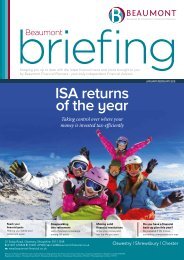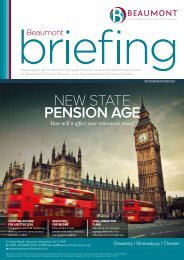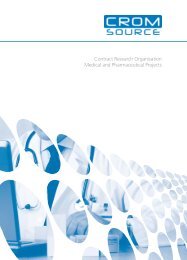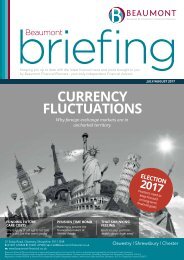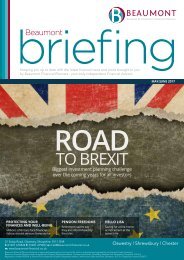Beaumont-Briefing-November-December-17
Create successful ePaper yourself
Turn your PDF publications into a flip-book with our unique Google optimized e-Paper software.
RETIREMENT<br />
whenever you get the chance. For example,<br />
if you receive a pay rise, why not arrange to<br />
pay some of it into your pension plan? You<br />
can also take this approach any time a regular<br />
expenditure comes to an end. If you pay off<br />
a loan, for instance, you could pay the extra<br />
money into your pension plan.<br />
Small, regular increases like this can make<br />
a big difference to what you eventually<br />
receive when you retire. Over the long<br />
term, your pension plan will have a better<br />
opportunity to grow.<br />
3. Pay in a lump sum<br />
In addition to making regular payments, you<br />
could also pay lump sums into your pension<br />
plan. And as with any personal payments you<br />
make into your plan, the Government will top<br />
it up with tax relief, up to a certain limit.<br />
If you received a bonus from work and<br />
paid a personal contribution of £10,000 of<br />
it into your pension plan, the Government<br />
would add £2,500 in tax relief. The tax<br />
treatment of pensions depends on individual<br />
circumstances and may be subject to change.<br />
Please note that contributions being paid<br />
net of basic-rate tax relate only to personal<br />
pension contributions.<br />
4. Review your investment choices<br />
Where your pension plan is invested can<br />
have a considerable effect on what you’ll<br />
eventually receive when you retire. You<br />
should regularly review how it’s invested.<br />
As you get older, it may be appropriate to<br />
consider changing your investment strategy<br />
to reduce investment risk as retirement<br />
draws closer.<br />
Looking beyond pensions<br />
Given the limits we’ve mentioned on<br />
how much you can put in and take out of<br />
your pension without paying potentially<br />
significant amounts of tax, it might be worth<br />
considering how to complement it with other<br />
savings and investments.<br />
An important tool is the Individual Savings<br />
Account (or ‘ISA’) which can be used to<br />
hold any combination of cash savings and<br />
investments in stocks and shares. In the<br />
current 20<strong>17</strong>/18 tax year, up to £20,000 can<br />
be contributed towards your ISA.<br />
Unlike a pension, while you will have paid<br />
tax on money that you save or invest into<br />
an ISA, any income that you receive and<br />
any capital gains from a rise in the value of<br />
your investments will be free from personal<br />
taxation, irrespective of any other earnings<br />
you have.<br />
Your ISA should become part of your investment<br />
strategy, but it’s important to remember that<br />
tax rules may change in the future, and the tax<br />
advantages of investing through an ISA will also<br />
depend on your personal circumstances.<br />
Recent changes to pension rules mean you<br />
can access up to 25% of your pension pots<br />
as a tax-free lump sum from the age of 55.<br />
While you can choose how to spend your<br />
Pension Commencement Lump Sum –<br />
better known as ‘tax-free cash’ – you should<br />
remember that any spending now is likely to<br />
reduce your potential income in retirement.<br />
Depending on your circumstances, it may<br />
be prudent to consider using this lump sum to<br />
pay off any debts or perhaps reinvest it for your<br />
future. If you choose to save or invest through<br />
an ISA, remember that any gains or income will<br />
themselves be tax-free – unlike in a pension.<br />
In the current economic and political climate,<br />
looking beyond pensions to put your money to<br />
work could give you more choices in retirement.<br />
The right solution will be unique to your goals<br />
and needs, but there are a number of investment<br />
strategies that could help grow your money in<br />
time for life after work. t<br />
TALK TO US SOONER<br />
RATHER THAN LATER<br />
Professional financial advice is important<br />
before making decisions around pension<br />
saving strategy. Whether your retirement is<br />
still some time away or it is fast approaching,<br />
it’s important to get a clear view of how close<br />
you are to achieving your aims. If you don’t<br />
think you’ll have enough money when you<br />
retire, there are a number of approaches<br />
you could take to build a bigger pot, but<br />
you’ll need to talk to us sooner rather than<br />
later. Please contact us – we look forward to<br />
hearing from you.<br />
THE VALUE OF INVESTMENTS AND INCOME<br />
FROM THEM MAY GO DOWN. YOU MAY NOT<br />
GET THE ORIGINAL AMOUNT INVESTED.<br />
PENSIONS ARE NOT NORMALLY<br />
ACCESSIBLE UNTIL AGE 55. FLUCTUATIONS<br />
IN FUND VALUE CAN IMPACT THE PENSION<br />
BENEFITS AVAILABLE. YOUR PENSION<br />
INCOME MAY ALSO BE IMPACTED BY<br />
INTEREST RATES AT THE TIME YOU TAKE<br />
YOUR BENEFITS.<br />
LEVELS, BASES OF AND RELIEFS FROM<br />
TAXATION MAY BE SUBJECT TO CHANGE, AND<br />
THEIR VALUE DEPENDS ON THE INDIVIDUAL<br />
CIRCUMSTANCES OF THE INVESTOR.<br />
Putting money in<br />
ISA<br />
• 0% relief on contributions<br />
• Annual ISA allowance for 20<strong>17</strong>/18<br />
is £20,000<br />
• You can invest in any combination of<br />
cash or stocks and shares<br />
Pension<br />
• 20% basic-rate tax relief is added to<br />
the contribution<br />
• Higher or additional-rate tax relief can<br />
be reclaimed from HM Revenue &<br />
Customs<br />
• Savers can obtain tax relief on up<br />
to 100% of UK earnings every year.<br />
This is subject to an annual allowance<br />
(£40,000 in 20<strong>17</strong>/18). Savers may ‘carry<br />
forward’ unused allowance from the<br />
three previous tax years<br />
• Those with no earnings get tax relief<br />
on the first £2,880 of contributions<br />
they make each year<br />
Taking money out<br />
ISA<br />
• 100% is available tax-efficiently<br />
Pension<br />
• 25% is available free<br />
• The rest is taxed at your<br />
marginal rate, so you may pay<br />
20%, 40% or 45% tax on your pension<br />
(or a combination)<br />
Pensions and Individual<br />
Savings Accounts are popular<br />
ways of saving tax-efficiently,<br />
but they are very different<br />
from each other – particularly<br />
in how they are taxed.<br />
05










